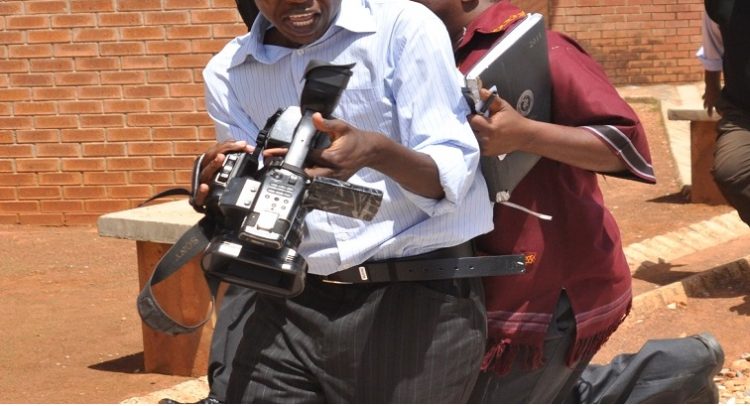THE GENERAL Secretary averred that not only would GJA, as a body, issue press statements whenever a journalist or a media house is attacked.
He said, “We also ensure that the matter ends in the law court and we (leadership of the association) follow it up to court and with the help and advices from our lawyers, we ensure that justice is served.”
The General Secretary, however, indicated that the GJA will not advise any media outlet to boycott activities of a group, personality or organization involved in any media brutality as Journalists have a duty to inform citizens.
Alexander Nii Katey Bannerman, Deputy Executive Secretary of the National Media Commission, says as part of its function of ensuring the highest journalistic practice, it has introduced a number of guidelines that seek to inject professionalism and ethical standards into journalism, and also guidelines for ethical journalism for the local language broadcasting.
“There has been constant engagement with the media especially going round to constitute bodies of the commission and then visiting media houses to imbibe in them the professionalism that one needs to keep the balance because, we are the watch dogs, the gate keepers; whatever we write, people tend to believe. Somebody might have read it and might not see it again, what he/she reads is what he believes,” Mr. Bannerman said.
He mentioned that the NMC has collaborated with the Ministry of Information, Ghana Journalists Association, the Ghana Independent Broadcasters Association as well as the Private Newspaper and Online Publishers Association (PRINPAG) to build the capacity of journalists, with the first one held in Kumasi early this year.
“In 2021, the NMC, in collaboration with the Ministry of Information, opened a secretariat where journalists can file their complaints of attacks on them.
The commission has intervened and sought the protection of journalists in various fields and mediated in many of the cases for sanity to prevail.
Journalists Cautioned To Be Professional
Mr. Bannerman called on journalists and media practitioners to be assertive and professional in their line of duty.
“We live in a society where whatever is reported in the media is accepted as the truth and once a half truth is aired as news, an individual who reads it may not have the opportunity to re-read it again except to carry the half-truth along. So, what we are saying is that, as journalists, we should cross-check our facts before coming out so we report accurately.
“The NMC, in collaboration with Ministry of Information and UNESCO, is developing guidelines for journalists to aid in their work.
He said the commission has been to two regions to solicit views from journalists to draft the guidelines and “We are consulting all journalists so that when the document is finally out, it will be a binding document for all journalists and not a document that belongs to the NMC,” he added.
The Deputy Minister of Information, Fati Abubakar, says Ghana’s performance on the rankings by ‘Reporters Without Boarders’ recently, has not been bad, stating that it could still be improved.
She said using five parameters, Ghana, on the Legal Framework, scored 81.4% on Socio cultural context – 79.6 percent and Political context – 66.61percent. Safety of journalists – 62.25 percent and on economic context pertaining to the conditions of journalists, Ghana scored 47.2 percent.
“Generally, our performance is average but as a beacon of democracy, and a country that runs second in Africa and 40th worldwide, there is room for improvement,” she added.
She further revealed that various forms of violations could occur everywhere, be it in a religious environment, traditional and political environment, stakeholders should continue to sensitise the public on the role of journalists.
“The public must know that if you are not satisfied with the utterances of any journalist, you can seek redress using legal means, you can sue for defamation, and other avenues available like the national media commission who are regulators of content and other platforms and not to attack any journalist in the country,” she emphasised.
Countries With Best Press Freedom Ratings
For the fifth time in a row, Norway retains the top spot as the country with the most press freedom.
Finland, Sweden, Denmark, and Costa Rica complete the top 5 countries on the ranking. Sadly, no African country featured in the top 20 countries.
Records for the past five years indicate that Ghana, in 2017, was 26th; 2018 – 23rd; 2019 – 27th; 2020 – 30th, 2021 – 30th .2022 – 60th in the world, according to World’s Press Freedom Index Report.
The country’s ranking in Africa for the past five years, however, is promising.
Ghana, in 2017, was 2nd; 2018 – 1st; 2019 – 3rd; 2020 – 2nd, 2021 – 3rd and 2022 – 10th.
According to the International Declaration on the Protection of Journalists, all journalists, media professionals and associated personnel, have the right to protection from all human rights violations and abuses including killing, torture, enforced disappearance, arbitrary arrest and detention, expulsion, intimidation, harassment, threats and acts of other forms of violence, among others.
BY Linda Tenyah-Ayettey


